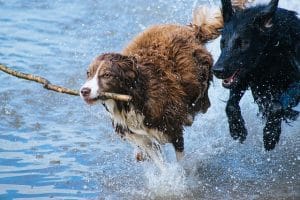Water intoxication is a genuine problem with dogs and one that really needs to be given much more visibility and attention online. In this help & advice blog post on Jug Dog we are going to delve into the world of canine water intoxication to help educate dog owners all over the world about it.
What is water intoxication in dogs?
Intoxication is to have too much of something and often when you hear the word it’s followed by alcohol or drugs. However, you can get intoxified by practically anything which includes water. Water intoxication is where a person or animal (in this case, dogs) has consumed too much water either by mouth or absorbed through the skin.
Water intoxication can also be referred to as water poisoning, hyperhydration, overhydration or water toxaemia. Water intoxication does not refer to drinking dirty, poisoned or infected water. Water intoxication is quite a rare occurrence which tends to happen in unusual circumstances such as extreme heat.
Consuming too much water is a form of poisoning and leads to complications such as hyponatremia (low levels of sodium (salt)) and/or the imbalance of electrolytes resulting in a disturbance in brain function. It is a serious condition to have which should be avoided at all costs as it can have life-threatening implications.
 Which dogs are most at risk?
Which dogs are most at risk?
All dogs are susceptible to hyperhydration. However, it is more likely to happen in the following conditions:
Dogs with low body mass
Intoxication can happen quicker with less water for dogs with low body masses such as greyhound-like breeds, puppies, elderly dogs and sick dogs. Low body masses means it will take less water to reach a high level of water in relation to their body mass and sodium levels.
Dogs living in extreme heat
Dogs who live in or experience periods of extreme heat are more likely to need to drink more and potentially drink too much if the heat is particularly bad and they’ve been unable to take any shelter. Extreme weather and access to water is a bad combination and the proper prevention is to avoid heat and direct sunlight altogether. We’ve written a blog on this in more detail.
Dogs near a constant water source
Water can be absorbed through the skin as well as the mouth, prolonged exposure to water in situations such as swimming or water play can lead to water intoxication. Dogs can also swallow too much water when jumping into open water after toys or while hunting animals. Dogs who live near lakes or on properties with a swimming pool they use are at particular risk. Water-loving breeds such as labradors should also be carefully supervised near water.
Dogs with polydipsia
In some extremely rare conditions, a dog may be suffering from a mental condition which compels them to drink more water even when they are already hydrated and not thirsty – this is called polydipsia. If you notice your dog drinking water non-stop contact a veterinarian immediately.
Symptoms of water intoxication in canines
Dogs progressing towards water intoxication isn’t always obvious. Many of these symptoms are also common with ailments and not just hyperhydration so be sure to first check with the ‘which dogs are at risk’ list. Here are some symptoms to look for:
Lack of coordination
Because a high intake of water causes neurological problems, dogs on the way to getting water intoxication can find themselves disorientated and unable to coordinate their movements like before. Look at the causes and this to determine if your dog has had too much.
Vomiting
Your dog’s body will try and defend itself and force the water out through vomiting. A dog with a lot of water in their system’s vomit may appear clearer and wetter than usual if over hydration is involved.
Nausea/Lethargic
Dogs will appear nauseous and lethargic when filled with water. If your dog has been playing in water or drinking water excessively and now they look out of sorts and not their usual self then water intoxication could be involved.
Dilated pupils
An over hydrated pooches pupils will appear noticeably larger when hyperhydrated almost as if they were high. This is the result of the low electrolytes and the brain disturbances h20 can cause in large volumes.
Salivating/drooling
Salivating and excessively drooling is often a symptom of a neurological problem in a canine. Having too large a volume of water in a body can seriously impair the brain which can manifest itself with a dog that is salivating profusely and or drooling.
Pink gums
A dog with too much aqua in their bodies can start to lose colour in their gums leaving them light and somewhat pink instead of the usual dark pink/red.
Collapse
If water intoxication is serious and left untreated for a long enough period of time the dog’s body may enter self-preservation mode and force them to collapse. If your dog has reached this state then medical attention should be sought immediately and without any delay.
Seizures
Alongside collapsing, a dog in an advanced intoxication stage may begin to suffer from seizures. Seizures themselves can cause serious neurological damage and medical attention is an absolute priority.
Death
Sadly, severe water intoxication which has been left untreated for a long enough period of time can lead to death either directly or indirectly. Death may be as a result of collapsing, seizures and a coma. As we’ve mentioned at the very beginning water intoxication is a very serious condition that should be ignored or left untreated.
Dog water intoxication treatment
Here are a couple of suggestions on how to treat a case of water intoxication. Please use your best judgement whether you should self diagnose and treat your dog or seek medical advice from a vet first. Do not take any risks with your dog’s health.
Stop water intake immediately
The first thing to do with a dog who is overhydrated is to take them away from the source of water immediately and to bring them inside and to dry off.
Increase salt intake
Hyponatremia occurs when the salt levels of the body become dangerously low. If your dog isn’t too bad try and give them a salty snack to try and counter the water in their body – some simple snacks to try are peanut butter and some of your wet dog food and dry dog food if you stir some salt in there (not too much). Dog treats which are similar to jerky are also very salty and ideal for this situation.
Taking diuretics
Diuretics can cause canines to urinate more often which speed up getting the process of getting rid of the excess fluids. Always seek medical attentions from a vet before self medicating your dog. You will probably need to be prescribed diuretics from a vet.
Warm them up
Take your dog to a warm area to try and encourage sweating to get rid of more of the excess water from the body. Works well in conjunction with the extra salt and diuretics for mild intoxication.
How long does water intoxication last in dogs
How long water intoxication lasts varies from dog to dog and a wide range of other factors such as the volume of water consumed and environmental factors such as the temperature. However, mild intoxication should go away in a few hours. Serious water intoxication will probably need over 24 hours and a potential overnight stay in the vet’s office. You can speed up the recovery time of water intoxication by following some of our treatment suggestions. Of course, avoiding intoxication should be the first course of action.
In extreme cases of harsh intoxication with survival, permanent kidney damage is possible which will have lifelong effects on your dog.
How to prevent your dog from getting water intoxication
Preventing water intoxication starts with being educated on the subject matter so by reading this article you’re on the right track. Other tips to avoid the terrible experience are:
Monitor water drinking
Keep an eye on how often you need to replenish their water bowl to see if they’re over doing it or becoming obsessively compulsive about drinking water. Make sure they don’t have an infinite source of water.
Limit water play time
If your dog is playing with the hose, in the swimming pool (even kids one), in rivers, oceans or the lake then simply limit their time in the drink.
Feed them salty snacks
If your dog is going to be playing in water a lot then keep them fed with salty snacks to avoid hyponatremia.

 Which dogs are most at risk?
Which dogs are most at risk?


My 2 year old Springer spaniel suddenly collapsed after swimming and playing in a river a couple of days ago. He started staggering and vomiting lots of water. We rushed him to the vets unfortunately they were not able to save him. He did not have a temperature so unlikely to be heat stroke. After googling I truly believe water intoxication was the cause. I had never heard of this before. The symptoms seem the same. I would like to raise awareness of this even though I don’t know if it was really the cause. Thank you for your information. We are heartbroken as you can imagine
We took our Portuguese water dog (he has a coat of black fur) to a dog-friendly beach along Lake Michigan on Labor Day weekend. We thought, what better way to spend a weekend in which temperatures were forecasted in the 90s F. Our dog was only 2 years old at the time, and it was almost a mile walk on sand through the woods to get to the beach. We were not competent dog owners. Likewise, we didn’t know a dog bred to work in the water would have a problem at the beach – where there was free access to a lake. My husband runs with our dog every day and decided to do their run, despite the heat but in the shade of the trees, running along the paths in the woods. After their run, they jumped in the lake to cool off. Our dog drank a lot of water! The lake water was the temperature of bathwater which should have been another red flag that our dog wasn’t going to cool down much in warm lake water. He left the water and appeared to be unable to find me though he was looking right at me on the shore. He did not respond when I called his name. Eventually he walked slowly over and sat down next to me. After a minute, he listed to the side like a drunken sailor. And then he fell over without moving a muscle. His eyes were open, staring straight ahead, his lids unblinking. It was heart-wrenching. He appeared to be in a coma. His breathing was very, very slow. I was so frightened for him. I could not get to stand up, much less walk him up the staircase which led to and from the shoreline, to get him out of the sun and into the shade of the woods. He weighs 64 lbs! I couldn’t carry him alone. Very nice people helped to carry him up the stairs and placed him on the ground in the wooded shade. He laid on the path where people and their dogs had to pass. People stopped to offer water and large dogs sniffed his face and still he did not blink an eye or move in any way. Someone checked his gums and said they were very pale, which isn’t healthy. I did know he was not healthy, but I sincerely appreciated the effort. No vehicles could get to him, and he was too heavy to carry the mile to the parking lot. But we had a wagon back at our car. My husband ran the trail back to the car and planned to return with it. I waited for his return for almost 40 minutes with no change in our dog. His breathing was so slow that I was sure it was just going to stop, and I prayed to keep it going. When my husband returned, we struggled with our dog’s weight, but were able to get him into the wagon. Unfortunately, the reason we didn’t bring the wagon with us in the first place was due to the nature of the sandy trail. The path was not only twisty but was also hilly. The wheels sunk into the sand; it was very tough to pull. At times, he fell out of the wagon when making a turn. I can’t begin to explain how shocking and sad it felt when that happened. We could see the parking lot from the trail when he started to stir and show signs of life. At this point, he was afraid of the wagon and would not stay in it. He could stand up and stumble a few steps. He would stop and fall back down. It was in this manner that we slowly, but finally, made it back to our car. It was excruciating, but exhilarating because we could see he was getting better at the same time. I can tell you that felt like pure joy. I sat next to him in the car to help keep his balance and prevent falling over. He never threw up. And he very slowly recovered. We survived the scare of a lifetime and one we’ll always remember. We’ll never know if our dog fell into a coma due to drinking too much water too quickly or whether it was due to heat stroke. We were far from our vet, in another state, on a Sunday of a holiday weekend. It was three days after the event that I took him to our vet. Our Vet’s thoughts were that our dog did not experience water intoxication or likely would have died without emergency assistance. On the other hand, when I googled the symptoms for heat stroke, and for water intoxication, our dog appears to fit the water intoxication symptoms which are very different. It doesn’t matter. I’m just glad our dog is alive. I am putting our experience out there as a warning to others that love their dogs to be more knowledgeable about potential dangers. I sincerely hope this was helpful.